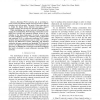Free Online Productivity Tools
i2Speak
i2Symbol
i2OCR
iTex2Img
iWeb2Print
iWeb2Shot
i2Type
iPdf2Split
iPdf2Merge
i2Bopomofo
i2Arabic
i2Style
i2Image
i2PDF
iLatex2Rtf
Sci2ools
PERCOM
2010
ACM
2010
ACM
Collaborative municipal Wi-Fi networks - challenges and opportunities
Abstract—Municipal Wi-Fi networks aim at providing Internet access and selected mobile network services to citizens, travelers, and civil servants. The goals of these networks are to bridge the digital divide, stimulate innovation, support economic growth, and increase city operations efficiency. While establishing such urban networks is financially challenging for municipalities, Wi-Fi-sharing communities accomplish good coverage and ubiquitous Internet access by capitalizing on the dense deployment of private access points in urban residential areas. By combining Wi-Fi communities and municipal Wi-Fi, a collaborative municipal Wi-Fi system promises cheap and ubiquitous access to mobile city services. However, the differences in intent, philosophy, and technical realization between community and municipal Wi-Fi networks prevent a straight-forward combination of both approaches. In this paper, we highlight the conceptual and technical challenges that need to be solved to create col...
| Added | 29 Jan 2011 |
| Updated | 29 Jan 2011 |
| Type | Journal |
| Year | 2010 |
| Where | PERCOM |
| Authors | Tobias Heer, René Hummen, Nicolai Viol, Hanno Wirtz, Stefan Götz, Klaus Wehrle |
Comments (0)

